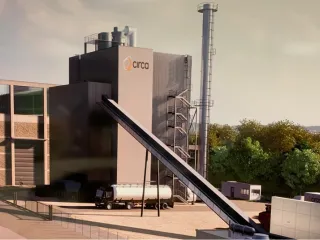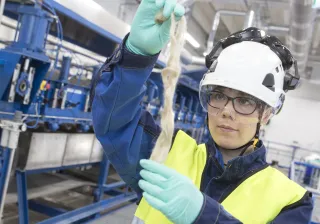Tightening sustainability targets and chemical regulation increase the demand for fossil-free alternatives. This also pressures the chemical industry to move to greener ingredients. Renewable chemicals company Circa and process technology supplier Valmet teamed up with VTT to scale up Circa’s production of Cyrene™, a less toxic bio-based solvent.
Key facts
VTT and Valmet helped Circa scale up their Cyrene™ production process.
VTT has the expertise and infrastructure for cutting-edge technology development and piloting.
The patented production process is circular and completely fossil-free.
Safer, greener solvents at scale
With increasing environmental awareness and stricter regulations on the way, there is a strong demand for more sustainable chemicals. Founded in 2006, Circa is a renewable chemicals company that develops and produces unique bio-based chemicals. Their products can replace toxic fossil-based ingredients in a wide range of applications.
Cyrene™, Circa’s flagship product, is a bio-based solvent derived from levoglucosenone (LGO). It is made from sustainable, non-food cellulosic feedstock. Cyrene™ can be used in paints, coatings and many industrial processes as a safer and greener alternative to traditional, fossil-based solvents. Circa has been producing this multipurpose solvent for 6 years, with over 200 papers documenting the results in a range of applications. The solvent performs equally well or better than petroleum-based alternatives. The only thing missing was a larger scale manufacturing plant.
Valmet is a leading global developer and supplier of process technologies, automation, and services for various industries. In 2021 Circa joined forces with Valmet to establish a new 1,000 tonne production plant in France as part of the EU-funded ReSolute project, which also benefits from the support of the France Relance program.
Valmet’s role was to supply the pyrolyser technology, a circulating fluidised bed (CFB) boiler and an automation system for the plant. Due to the unique nature of Circa’s patented Furacell™ production process, extensive piloting in specialised facilities was required to ensure the viability and scalability of the technology.

Expert collaboration leads to commercial viability
Circa had been exploring different ways to produce Cyrene™ on a larger scale. This is where Valmet came in. In 2020, Valmet performed a technology study to evaluate whether their pyrolysis process could meet Circa’s Furacell™ production requirements. Due to increased material prices at the end of 2021, Circa had to re-engineer and switch suppliers for their Furacell™ process. Valmet was selected by Circa as a preferred cooperation partner thanks to their high-efficiency, energy-balanced pyrolysis process.
“We are a leading commercial supplier of these pyrolysis plants,” says Jari Niemelä, Director of New Technologies at Valmet. “We also supplied the world’s largest pyrolysis plant in Joensuu, which was commissioned in 2013.”
"Valmet proposed that the boiler and pyrolyser could be combined and the biochar, which is a by-product of the Cyrene production process, could be used to fuel the boiler. That was a big advantage in terms of operation costs,” explains Philipp Morgenthaler, Head of Manufacturing at Circa. “Sustainability is at the centre of everything we do and being able to use the char really improved the circularity of the production process."
To validate their technology solutions, Valmet teamed up with VTT. The tailorable piloting facilities in Espoo and Jyväskylä, Finland, provided the necessary tools to confirm the technical viability of the production process on a larger scale.
Valmet and VTT have a long history together. With the pyrolysis and combustion development partnership going back to the 1980s, VTT was an easy choice to turn to once again.
“Our high-quality facilities and customer-centric approach have enabled us to support Valmet in numerous projects,” explains Jaakko Kuusisaari, Customer Account Lead at VTT. “With our scientific know-how, we are able to serve customers in various industries. Our goal is to help our customers succeed commercially. We understand their needs and, in this case, we helped Valmet in supporting their customer to succeed.”
Sustainability is at the centre of everything we do and being able to use the char really improved the circularity of the production process.
Developing an energy-self-sufficient process
Testing and piloting were needed to get the pyrolysis process working as desired and to ensure a high by-product utilisation rate in the boiler.
VTT Bioruukki is an open-access pilot facility located in Espoo. It provides a unique combination of pilot-scale process development units and R&D services. With decades of experience in thermochemical conversions, industrial chemistry and biomass processing, the pilot centre offers excellent facilities for developing and testing new, cutting-edge solutions. Valmet also utilised VTT infrastructure in Jyväskylä, developing an efficient way of using the leftover biochar from the pyrolysis process. Using biochar to fuel the boiler makes the pyrolysis process circular and almost fully energy self-sufficient.
“The manufacturing process for Cyrene™ uses non-food bio-based raw materials, as opposed to other, fossil-based solvents,” says Niemelä from Valmet. “In addition, the process produces excess biochar that could alternatively be used to replace coal in various industries. Not only is the process completely fossil-free, but it can also provide other industries with greener fuel."
From piloting to manufacturing plant
The main challenges were Circa’s unique pyrolysis process and the project's tight schedule. The development started small and was scaled up at VTT’s pilot facilities once the results from the smaller-scale tests looked promising. When the pyrolysis process and biochar utilisation started working on a larger scale, Circa had sufficient proof to build the plant in France.
“This was the first bigger-scale trial that we did on the setup for the ReSolute plant. It was very helpful in confirming theoretical values like the product yield, which was even better than we had calculated,” says Morgenthaler.
“Our aim is always commercial viability, and we know we can trust VTT to help us reach that,” explains Niemelä from Valmet. “VTT has wide-ranging expertise from their projects with other companies, which benefits us. They also have more R&D staff than us, which is a valuable resource.”
Niemelä is happy with the results of the collaboration.
“We’re continuing the development work at the plant in France. Thanks to VTT, we have valuable knowledge about what we need to test and how.”
Our aim is always commercial viability, and we know we can trust VTT to help us reach that.










